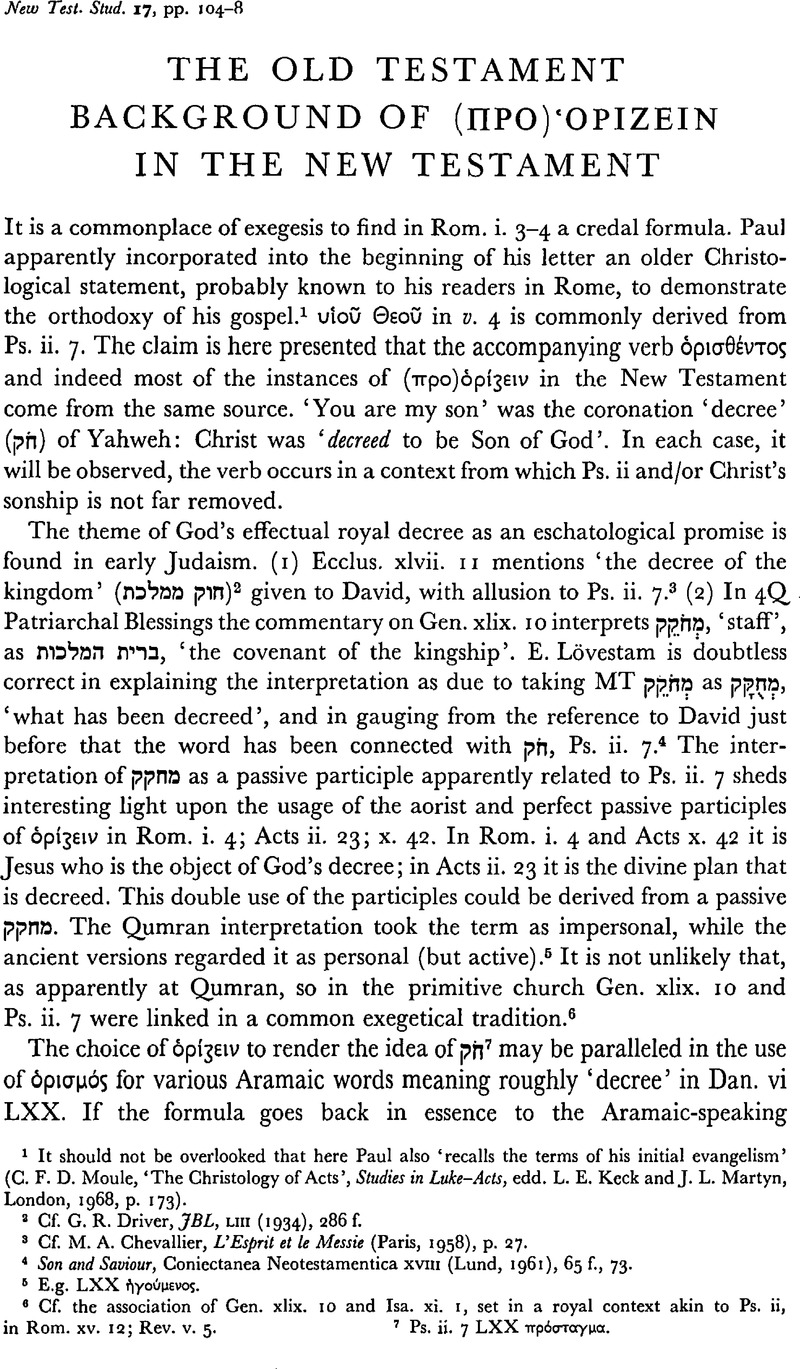Article contents
The Old Testament Background of (προ) ὁρίзειν in the New Testament
Published online by Cambridge University Press: 05 February 2009
Abstract

- Type
- Short Studies
- Information
- Copyright
- Copyright © Cambridge University Press 1970
References
page 104 note 1 It should not be overlooked that here Paul also ‘recalls the terms of his initial evangelism’ (Moule, C. F. D., ‘The Christology of Acts’, Studies in Luke–Acts, edd. Keck, L. E. and Martyn, J. L., London, 1968, p. 173)Google Scholar.
page 104 note 2 Cf. Driver, G. R., JBL, LIII (1934), 286 f.Google Scholar
page 104 note 3 Cf. Chevallier, M. A., ĽEsprit et le Messie (Paris, 1958), p. 27.Google Scholar
page 104 note 4 Son and Saviour, Coniectanea Neotestamentica XVIII (Lund, 1961), 65 f., 73.Google Scholar
page 104 note 5 E.g. LXX ήγούμενος.
page 104 note 6 Cf. the association of Gen. xlix. 10 and Isa. xi. 1, set in a royal context akin to Ps. ii, in Rom. xv. 12; Rev. v. 5.
page 104 note 7 Ps. ii. 7 LXX πρόσταγμα.
page 105 note 1 Cf. e.g. Fuller, R. H., The Foundations of NT Christology (London, 1965), p. 166Google Scholar; Kramer, W., Christ, Lord, Son of God (E. T. London, 1966), para. 24c.Google Scholar
page 105 note 2 In the Targum it renders ΡΡπ at Jud. v. 14; Isa. x. 1. In Dan. LXX vi. 13 (12) $$$ is translated ώρίσω; in the Peshitta $$$ renders προορíзειν at Acts iv. 28; Rom. viii. 30; Eph. i. 4 (5), 11.
page 105 note 3 Similarity of spelling in the Aramaic and Greek words may have suggested the rendering: for this motivation in translation cf. Moule, C. F. D., An Idiom Book of NT Greek (Cambridge, 1953), pp. 185 f.Google Scholar
page 105 note 4 Wilcox, Cf. M., The Semitisms of Acts (Oxford, 1965), p. 169.Google Scholar
page 105 note 5 Chevallier, , L'Esprit, pp. 3–50Google Scholar, has amassed the evidence.
page 105 note 6 Gärtner, B., The Areopagus Speech and Natural Revelation (Uppsala, 1955), p. 232Google Scholar, has suggested that in view of v. 26 the reference here must be to ‘the man predestined by God for the work of salvation’.
page 105 note 7 IKings ii. 4 ( = II Chron. vi. 16); viii. 25; ix. 5 ( = II Chron. vii. 18); Jer. xxxiii. 17.
page 105 note 8 Cf. Ps. Sol. xvii. 4; 4QPB i. 2 ┐∼⌉ℸℸ ℵΟℶ Π┐ℶ[∼ ℵℸ] (cf. van der Woude, A. S., Die messianischen Vorstellungen der Gemeinde von Qumran, Assen, 1957, p. 170)Google Scholar.
page 106 note 1 For the primitive character of the language used in the prayer see van Iersel, B. M. F., ‘Der Sohn’ in den synoptischen Jesusworten, Supplement to Novum Testamentum III (Leiden, 1961), pp. 65 f.Google Scholar
page 106 note 2 Cf. Schweizer, E., ‘The Concept of the Davidie “Son of God” in Acts and its OT Background’, Studies in Luke–Acts, p. 186.Google Scholar
page 106 note 3 Cf. e.g. van Iersel, ‘Der Sohn’, p. 68.
page 106 note 4 ‘Der Sohn’, pp. 75–7.
page 106 note 5 Mark xiv. 21 (cf. 18); Matt. xxvi. 24; cf. John xiii. 18.
page 106 note 6 Cf. the proleptic use of Ps. ii. 2 in the narrative of Acts iv. 5 συναχθ⋯ναι αύτ⋯ν τούς άρχοντας noted by Cerfaux, L., ‘La première communauté chrétienne’, Recueil II (Gembloux, 1954), 143,Google Scholar and his suggestion there that in the first part of Acts έπί τό αύτό reflects the LXX phrase in Ps. ii. 2 (see further Wilcox, Semitisms, pp. 95 ff.).
page 106 note 7 Cf. Cerfaux, , ‘Vestiges d'un florilège dans le I Cor. i. 18-iii. 23?,’ Recueil II, 319–32.Google Scholar
page 107 note 1 Cf. Cerfaux, pp. 321 f.
page 107 note 2 ‘I Korinther i. 18 und die Thematik des jüdaischen Bußtages’, Biblica, XXXII (1951), 97–103.Google Scholar
page 107 note 3 Cf. Doeve, J., Jewish Hermeneutlics in the Synoptic Gospels and Acts (Assen, 1954), p. 173.Google Scholar
page 107 note 4 Note the similar sequence of Ps. ii. 1–2 LXX έθνη, λαοι, βασιλεīς, άρχοντες and Ps. xxxii. 10 έθν⋯ν, λα⋯ν, άρχόντων.
page 107 note 5 Acts xiii. 27 ff. also links the άρχοντες with the crucifixion. It is striking that Acts iii. 17; xiii. 27 and I Cor. ii. 8 all mention the rulers' lack of knowledge.
page 107 note 6 For a summary of the discussion see Morrison, C. D., The Powers That Be (London, 1960), pp. 23 f., 44 f.Google Scholar
page 107 note 7 Biblica, XXXII, 99 n. 3.Google Scholar
page 107 note 8 Jesus Christ in the OT (London, 1965), pp. 141–3.Google Scholar
page 108 note 1 Matt. v 8; I Cor. x. 26 (cf. Cerfaux, , ‘ “Kyrios” dans les citations pauliniennes de l'A.T.,’ Recueil I, 176).Google Scholar
page 108 note 2 Cf. Lövestam, , Son and Saviour, p. 24.Google Scholar
page 108 note 3 Three cases of όριзειν in the NT are non-Christological and fall outside the scope of Ps. ii: Acts xi. 29; xvii. 26 (reflecting ℶ'ℵ$$$┐ Deut. xxxii. 8; Ps. lxxiv. 17); Heb. iv. 7.
- 1
- Cited by


